|
|
||
|
Pro Tools
FILMFESTIVALS | 24/7 world wide coverageWelcome ! Enjoy the best of both worlds: Film & Festival News, exploring the best of the film festivals community. Launched in 1995, relentlessly connecting films to festivals, documenting and promoting festivals worldwide. Sorry for the interruption, we needed to correct and upgrade some modules. Working on a new website. For collaboration, editorial contributions, or publicity, please send us an email here. You need for put your full detail information if you want to be considered seriously. Thanks for understanding. User login |
Vanessa McMahonVanessa is a novel writer, screenwriter, rep and a film producer. She shares her discoveries and film surprises. :-)
 Interview with Writer/Director Nick Pollack for 'And Though the Music Ended, We Danced on Through the Night' (2017)
Australian film team writer/director Nick Pollack and producer Aaron Bush attended the 2017 Napa Valley Film Festival with their 30 minute short film 'And Though the Music Ended, We Danced on Through the Night'. The film follows three frenetic characters hanging on at the end of their rope after what might be a tragic accident. Reminiscent of Aronofsky's 'Requiem for a Dream' (2000), the lives of these three desperate characters are intertwined as they stand at the tipping point into either salvation or madness. The film was co written by Nick Pollack and Ryan Hayward and produced by Aaron Bush, Nick Pollack and Marisa Zamora.
I interviewed Nick Pollack during the festival about their film. Here is what he had to say:
Were the events in the film based on a true story or a fictional experiment? NICK: It was a little of both - a real event inspired the nucleus of the story, but we built a wider fictional world around that. It spawned a very depressing ‘cinematic universe’ if you will. The origin of the script was a short story that my good friend Ryan Hayward wrote six years ago of a woman whose son had died in a car accident, yet she kept paying his phone bill, just so she could hear his voice, and leave short messages on the answering service. I read it and it was such a strong, heartbreaking visual which got me thinking about how the son had died, what life she must have now, how else she maintained his memory and everything that surrounded that fictional scenario. So Ryan and I wrote an initial draft based on the mum’s story. And while people who read it liked how it read on the page, we weren’t getting much traction in terms of them wanting to see it as a film. We were hearing that it seemed like an extended public service announcement for not using a mobile phone while driving. So we looked at how we could tell a wider story, about how different people who were dealing with different types of loss processed it. We came up with the narratives of a woman dealing with the loss of a relationship and an academic man dealing with the loss of his life and memories with early stage Alzheimer’s. It was after a few draft that we realized we could link the three character’s stories and have them all intersect at the pivotal climatic moment.
The title of the film is very symbolic. What, in your words, does it mean for you? NICK: As a film maker, I’m attracted to titles that say something. It’s the first impression you get to make with a potential viewer and you want to intrigue them, yet also stand out from the multitude of viewing options they have at a film festival, online or through a streaming service. This title though - AND THOUGH THE MUSIC ENDED WE DANCED ON THROUGH THE NIGHT - refers specifically to the major theme running through the film, being ‘loss’ and what we do to process it. How do we find the strength to keep going once that thing we held close - the ‘music’ as it were - has ended? How do the characters find the strength to keep ‘dancing’ after they have lost a child, a lover or their memory to Alzheimer’s, and the darkness that that loss brings, being ‘the night’ of the title? Additionally, music plays a crucial role in my filmmaking also, which is why the scripts that I write tend to have lyrical titles; title that sound like they could be a line from a song. It’s not always the case, but this project and our next one ‘ANY GIRL WHO LOVES THE BEATLES IS BOUND TO BREAK YOUR HEART have long, somewhat abstract titles. Plus, it’s a marketing tool - a longer title beginning with the letter ‘A’ is going to stand out a lot more on the festival guide or a sales document than a film with a short title nestled back among the ‘P’ films. And maybe deep down I have a vendetta against the folks who put the letters up on the marquees outside cinemas and I just want to make their life hell putting up our film title. :)
Does the Aboriginal man ever finish his book? Or is that meant to be kept a mystery? NICK: Ha, it’s an interesting question, and I guess it feeds into what the title is about - does he keep dancing once he has lost everything? We actually shot a small sequence which didn’t make the final film where his bracelet fell off as he retreats back into the bush after the accident, implying that he may be lost in bush, with no way to return to society, and no way for anyone who found him to know who he was. But it was cut to maintain a level of… not tying up all the loose ends, I guess. So I think you can believe whatever you wish - if you’re an optimist, he managed to get back to the nursing home and finish his book. If you’re a pessimist, maybe he was lost in the bush to perish. Or perhaps a realist will imagine something in-between both those options.
I love the feeling of anxiety and disconnection in the film. Do you think in the digital age we are more connected or separated? NICK: It’s a subject I’m fascinated with also. Are we better off with what social media and technology provides us or are we on a societal decline? You can’t deny we are more connected, but those connections are lot more ephemeral. We know more about each others lives than we should and we are given a level of voyeurism into those lives that is questionably unhealthy. What’s the saying - ‘you’re never more alone than when you’re in a crowd’ - I think it’s made it much easier to connect with people, but also much harder to stand out in that crowd and in the noise of everyone else trying to connect. That’s what I wanted to cover especially in Abigail / the nurse’s story, and how the pull of ‘needing to know’ (and the power that social media can give us) can turn a person who is otherwise a together, compassionate soul - what’s more caring and empathetic than nurse, right? - into someone who is essentially a stalker. But each character also uses technology to help them maintain the connection they had to what they have lost - Joanne keeps the recording of her son’s voice to keep his memory alive, Percy uses his computer and online research to build his database so he can record all his memories before they are lost to his disease and Abigail uses social media to maintain the connection to the boyfriend she lost.
The acting is superb. How did you go about casting it? NICK: Thank you so much - yes, the acting really is what holds the film together. Given the jumping time-lines (Abigail’s story is in the past, Percy’s in the present and Joanne’s in the future), the emotional core of this film could have failed spectacularly if we weren’t so blessed with our talent. The casting process on this one though was really identifying who we wanted and approaching them. We didn’t have a casting director or casting sessions - I just wrote some very impassioned letters. Debra Lawrance was on board for almost two years before we started shooting, and was the only person we ever approached to play Joanne. Ryan, my co-writer, had performed with Debra in a play several years ago so he had a connection with her, but there was never anyone else we could have thought to play the role. Thankfully, she responded to script immediately and we were off to the races, which was a godsend. Debra is a hugely respected actor locally and hence she is also very selective in what she does these days, so it was a major blessing to have her on board from the beginning. Casting ‘Percy’ was a little more tricky. Australia has many incredible actors of Aboriginal background, but they are all in such high demand at the moment that everyone we approached couldn’t fit it in their schedule for a long time after we were hoping to film. Then, rather serendipitously at the beginning of last year, Quentin Tarantino came to Sydney and held a special event where he screened his favorite Australian film – Fred Schepisi’s THE CHANT OF JIMMIE BLACKSMITH (1978). Mid screening, I turned to Bushy and whispered ‘How amazing would it be if we could get ‘Jimmie Blacksmith’ in our film?’ So taking a chance at a long shot, I reached out to him with a heartfelt letter, begging him to consider our small film. The following day I get a phone call and a voice on the other end saying “Nick? It’s Tommy Lewis. I read your script. I love it. Let’s do it”. That was a very great day, let me tell you - to realize we had lined up two legends of the Australian screen in our film. We topped that off with the trifecta of the amazing Emily Gruhl who came recommended to me by another actor Tom Carney who said ‘she’s the next big thing’, and we were equally blessed to have to her respond so well to the character of Abigail that she agreed almost instantly to do it. So all in all, the casting process was incredibly fortuitous. The real pleasure for me was setting the scene, calling ‘Action’ and just letting them do what they know to do, I had to do very little directing on set. It was a dream cast for these roles.
Do you plan to make this a feature in the future? NICK: We get asked that a bit actually, and I guess it makes sense, to build upon a world that is already established. But I really only see this as a stand alone piece. There are definitely ways we could make the short film bigger, perhaps tell more characters stories and how they feed into this moment that we covered. But we all kind of agreed that this feels like the story - half an hour is all that this film needs to reveal it’s nuances.
You both work as a solid team. How did you both meet and start working together? NICK: Sometimes I think we were thrown together as punishment for terrible things we did in a past life. We met at a production house we were based at in 2004 - I was editing and had just started directing commercials and Bushy was running the camera department. We’ve worked on a multitude of projects together since, so 13, 14 years together. I think we work well because our skills complement each other - I call him a ‘bulldog producer’ because he just gets things done, with very little messing about. He’s very vocal and he just makes things, in a very practical sense, happen. You can always rely on him to deliver on what’s required - Bushy’s very much a man of his word. I would say he sees the bigger picture, whereas, I see the finer details within a project and the script and how they all feed into each other. I know ‘’why’ things have to happen in a certain way, and he takes care of ‘the how and the where’ so that they do actually happen in that way. However, I must point out that the person who actually held everything together is our other incredible producer Marisa Zamora, the most hard working, dedicated producer I’ve ever worked with. Unquestionably, this film would not have been made without her pulling everything together behind the scenes. We are blessed to have her on our team. I think the team works so well is because neither of us is trying to compete to do the others role, and no one steps on anyone elses toes. I’ve seen producers that are ‘frustrated directors’ who get on projects looking to put their stamp on it, but Marisa and Bushy respect the director’s and the writer’s job. They’ll make suggestions that more often than not make the project far greater, but they are more concerned with helping to deliver a unified creative vision, than to make the vision their own.
You recently attended Napa Valley Film Fest. How was that experience? NICK: In a word – Wow! We both remarked throughout the festival that we didn’t see one bad film - the curating of the films was impeccable and we felt humble having been a part of the very select group of film from around the world. The parties were off the hook, the screening venues had such a wonderful rustic charm that we rarely get to experience living in the city, and the people who attended were so nice to us at every turn. Plus everything seemed to run smoothly, something to be particularly congratulated given the fires and rebuilding stage the area was going through at the time. We met some lovely people - film makers and Napa / San Fran locals - who we have stayed in contact with after the event, who have extended genuine invitations to visit and stay with them if we ever pass through their cities. It was the perfect place to premiere our film. A really special experience.
How did audiences react to your film? NICK: The response we’ve had has been overwhelmingly positive when we screened it to audiences. It’s always intriguing to see what one audience takes from a moment that another doesn’t. For instance, the scenes with Abigail hacking into the websites garnered a few hearty laughs at the last screening whilst at other screenings, they gasp at her audacity. But the most rewarding feedback has been how moved the audience has been at reveal of the final climax. To see and hear a room being moved to tears is a really special feeling - to know you have been a part of something that is that engaging on a emotional level makes the effort worth it. People have been really kind to us after the screenings also, sharing deeply personal stories of their own that they felt connected to our film through.
What are you working on next? NICK: We have been trying to get our musical romance feature ANY GIRL WHO LOVES THE BEATLES IS BOUND TO BREAK YOUR HEART into production for several years now. It’s a tricky one as it’s set against the Sydney Festival, which runs for 3 weeks in January each year. We keep aiming to film within that time frame, but lining up everyone’s schedules (and the ever elusive finance) is a game of chess. I have just finished writing that story into a novel as well to try and build an audience before the film is made, but I’m learning that that is a task in itself to get out there into people’s hands (shameless plug - it’s out on Amazon and the Kindle store, so please have a read and let us know what you think). I’m working on several other scripts of my own, plus I’m helping a local writer Cam Pascoe with a screenplay that I’d like to direct, a thriller set against the visually stunning northern Australian cane fields. It’s an exciting premise with a twist for the antagonist, so hopefully we can make that in 2018 if things line up. In the meantime, it’s back to the world of commercial directing in Sydney and finishing book three of a childrens middle grade book series called ‘ZODEE ACK, MY IMAGINARY ENEMY’.
Tom E. Lewis from 'And Though the Music Ended, We Danced On Through the Night' (2017) still shot.
Interview by Vanessa McMahon
07.12.2017 | Vanessa McMahon's blog Cat. : Interview with Writer/Director Nick Pollack for 'And Though the Music Ended We Danced On Through the Night' (2017) Interviews
|
LinksThe Bulletin Board > The Bulletin Board Blog Following News Interview with EFM (Berlin) Director
Interview with IFTA Chairman (AFM)
Interview with Cannes Marche du Film Director
Filmfestivals.com dailies live coverage from > Live from India
Useful links for the indies: > Big files transfer
+ SUBSCRIBE to the weekly Newsletter DealsUser imagesAbout Vanessa McMahonThe Editor |


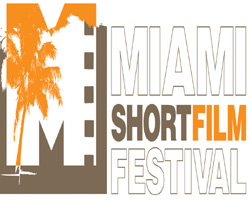















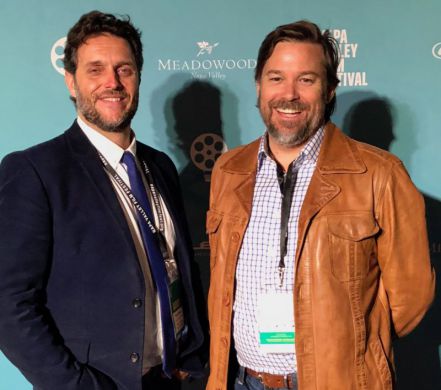 Nick Pollack (left) and Aaron Bush (right).
Nick Pollack (left) and Aaron Bush (right).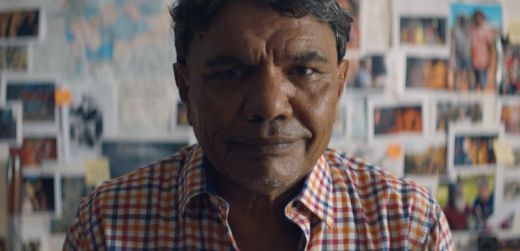
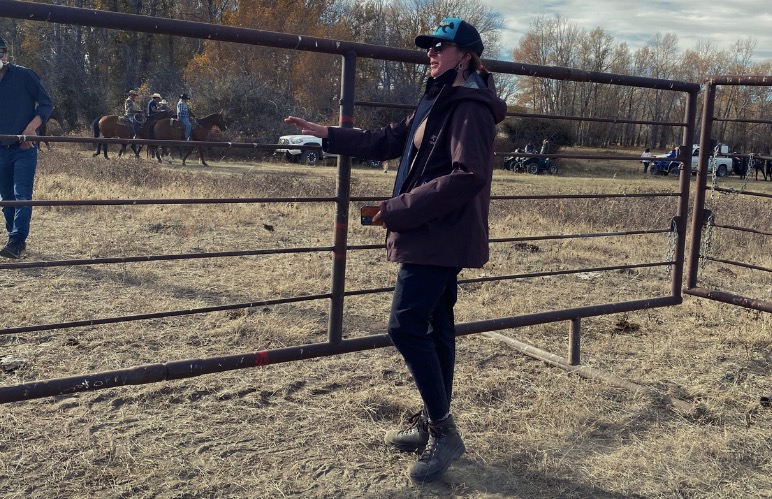
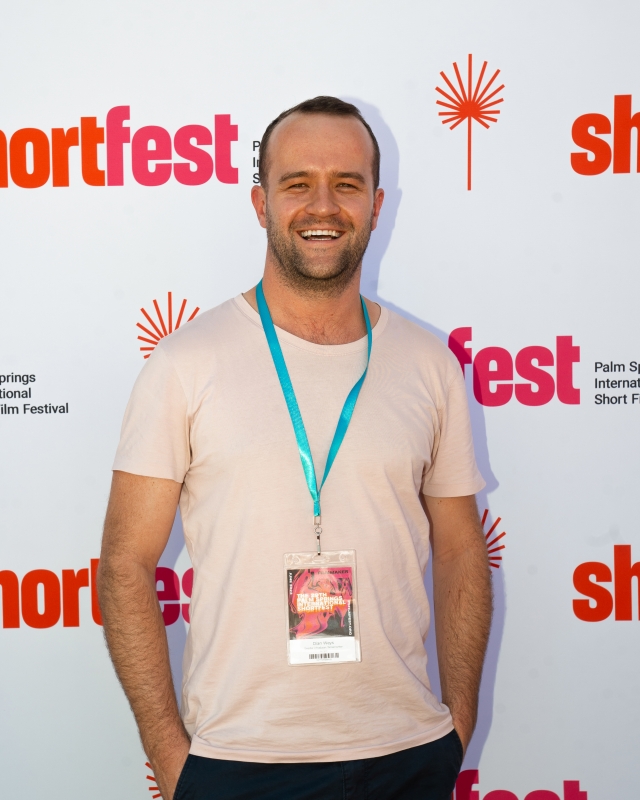
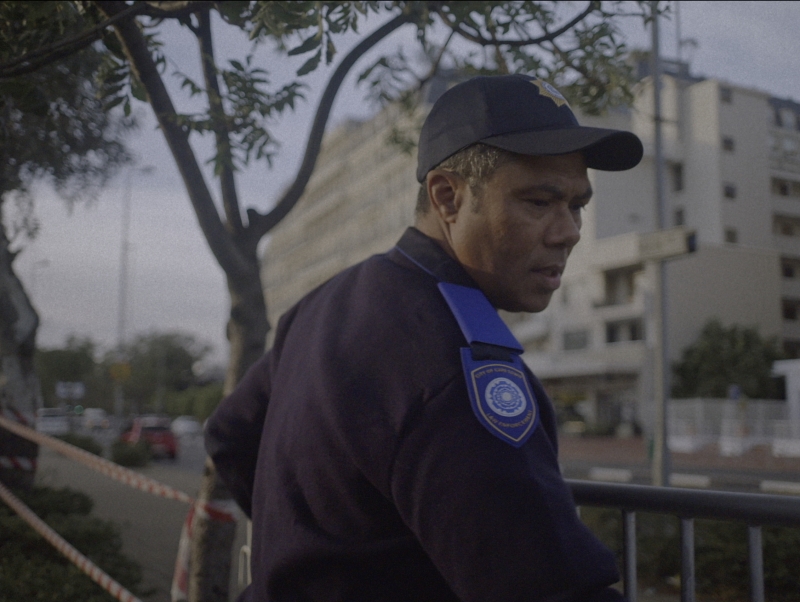
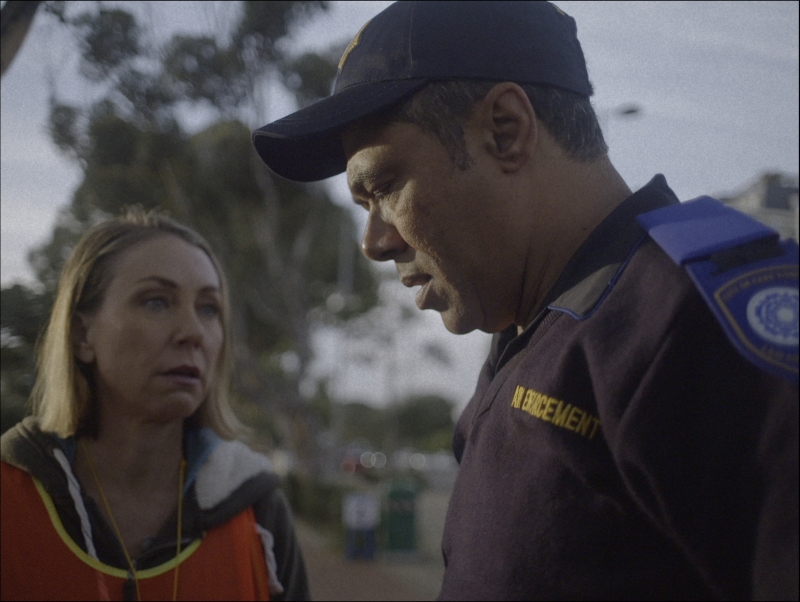
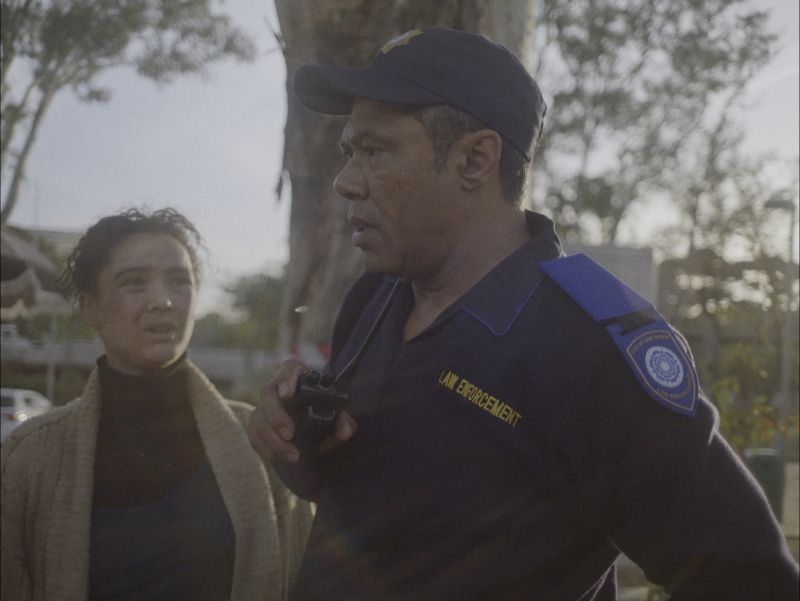
.jpg)



